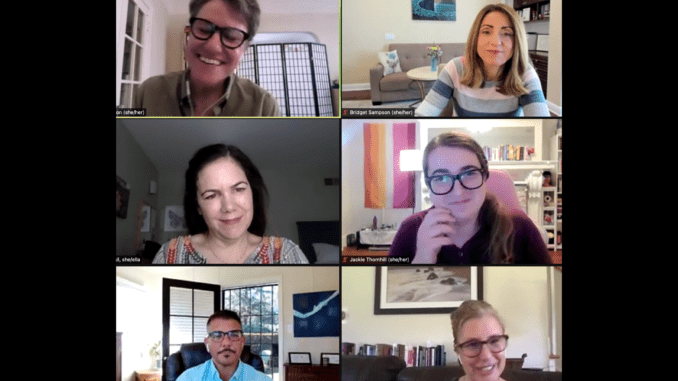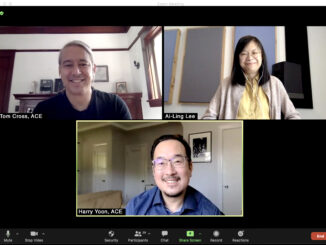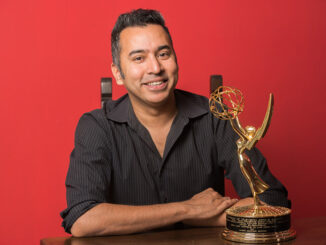
By Kristin Marguerite Doidge
When “Inside Voices: Industry Parents and Raising Transgender or Gender Diverse Children,” took place last month, a panel of esteemed clinicians and advocates not only shared invaluable expert insights and clinical information, but also powerful personal stories with the nearly 30 participants who joined the 90-minute-long discussion online. The Nov. 21 Zoom event was co-hosted by the Women’s Steering Committee (WSC) and the LGBTQ+ Steering Committee.
Panelists included Dr. “Jo” Johanna Olson-Kennedy, medical director of the Center for Transyouth Health and Development at Children’s Hospital Los Angeles; Aydin Olson-Kennedy, licensed clinical social worker and the executive director of the Los Angeles Gender Center; Cristina Vigil, licensed clinical social worker at Los Angeles Unified School District where she provides SOGIE (Sexual Orientation, Gender Identity and Expression) training, advocacy and support; Bridget Sampson, founder and chief executive of Sampson Coaching and Consulting, and cofounder of Transgender School and cohost of the Transgender School podcast with her daughter, Jackie Thornhill; and Thornhill, a proud LGBTQIA+ advocate and vice president of political affairs for The Harvey Milk LGBTQ Democratic Club in San Francisco.
In her opening remarks, Josie Azzam, co-chair of the WSC, said the goal of the event was to create a safe space to share, connect, and learn from one another. Moderator Amy Duddleston, ACE, started off the discussion by sharing that she and her wife, Hilary, are the mothers of a 16-year-old nonbinary child who came out in May.
Starting with Sampson, she asked about the experience of having a transgender daughter come out to her as a teenager five years ago.
“The way that I saw it at the time, it felt like a huge shock,” Sampson said. “Even though I was teaching at a university and was very aware of all forms of diversity, I was pretty clueless about what it means to be transgender, and so I didn’t respond well. I have a lot of regret about that now. I started coming around, and eventually wanted to educate others and be an advocate…and so now we have Transgender School and we’re out there sharing our story.”
As for Thornhill’s experience, she felt that she was “very lucky,” in terms of the acceptance she felt coming out to her friends and family, adding that with her younger sister, “there wasn’t really a lot of pushback. It was just kind of like, ‘oh really? Okay.’…I didn’t feel like she was uncomfortable around me or anything like that.”
While it might be natural for some parents to question their children as to whether their coming out is “just a phase,” Dr. Olson-Kennedy explained that “the very first thing that should immediately be done is that you should listen to your kid and ask questions.”
“That’s probably the single most important and useful piece of all of this, especially when somebody is first coming out and talking about this very vulnerable thing with a parent,” she added. “As a parent, recognize that your young person has been doing a lot of their own work for a longer time than you’ve been invited to the party.”
For Aydin Olson-Kennedy, the experience of coming out first as a lesbian at 15-years-old and later as a transgender person at 30-years-old to his own parents—and seeing how they processed it—has impacted how he counsels parents as a social worker. “When we disclose that we’re trans or non-binary or gender non-conforming, we are in a very specific place of fragility within ourselves and within our own experience,” he said, adding that parents and caregivers might try using ownership statements, such as “I’m curious about,” or “I’m confused by,” to help take some of the pressure off the loved one who is disclosing.
Before initiating an active question-and-answer segment to close the panel discussion, Duddleston asked Vigil about how school environments can provide support or resources to both students and parents alike. The focus of her training with staff at LAUSD, she said, is on saving lives, given the increase in suicidality and self-harm among transgender and gender diverse children.
“The data is telling us that using a child’s name and pronouns that they identify is the best thing we can do for their mental health,” Vigil explained. “Our job is to ensure that our students are as healthy as they can [be] so they can learn.” She also said that parents can ask about the kind of books and resources available in the classroom to ensure that diverse voices are being amplified.
No matter what, Dr. Olson-Kennedy said, “let the young person be the guide.”
Looking for resources for raising transgender or gender diverse children? Start here:
Transgender School: https://transgenderschool.org/
Transgender School Podcast: https://transgenderschool.org/podcast/
PFLAG: https://pflag.org/chapter/pflag-los-angeles
The Help Group’s Kaleidoscope Program: https://www.kaleidoscopelgbtq.org/
Welcoming Schools Book Lists: https://welcomingschools.org/resources/books
If your child is transgender or gender diverse, and you want support from other parents, please email FamilySupport@TransformingFamily.org for more information.
The WSC wishes to thank Nicki Bauer, Transforming Family, Shiran Amir, and Adriana Iglesias-Dietl, as well as the WSC volunteers and LGBTQ+ steering committee volunteers for their support in presenting this important and informative event.
Kristin Marguerite Doidge is a freelance writer and the author of a forthcoming biography on Nora Ephron.





